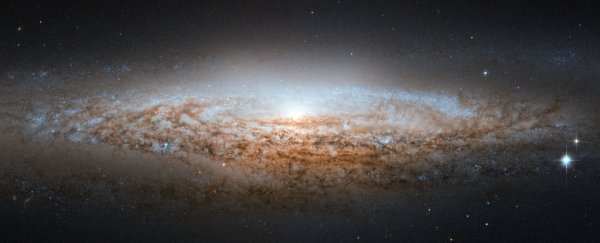Trying to find an answer to the question of whether humanity is all alone in the cosmos is what the search for extraterrestrial intelligence (SETI) is all about, and a new equation ought to give hope to the sky-watching optimists among us.
At least, kind of. Instead of seeking to estimate whether technologically advanced species currently exist elsewhere in the Universe – the focus of the famous but arguably flawed Drake equation – the researchers are interested in a broader question: are we the only advanced civilisation ever? And by their calculations, the odds are against us being unique.
According to astronomer Adam Frank from the University of Rochester, one of the problems with the Drake equation is that it incorporates the hypothetical length of time advanced civilisations exist for – something we're perhaps not well equipped to be speculating about.
"The fact that humans have had rudimentary technology for roughly 10,000 years doesn't really tell us if other societies would last that long or perhaps much longer," says Frank.
But by reformulating the equation to look at the history of the whole Universe instead, the team argues that they can avoid the ambiguity of longevity estimates.
"Rather than asking how many civilisations may exist now, we ask 'Are we the only technological species that has ever arisen?'" said fellow researcher Woodruff Sullivan from the University of Washington. "This shifted focus eliminates the uncertainty of the civilisation lifetime question and allows us to address what we call the 'cosmic archaeological question' – how often in the history of the universe has life evolved to an advanced state?"
Given that this calculation would still involve a lot of unknowns, the team frames the question by calculating the odds against intelligent life occurring elsewhere in the Universe.
Armed with new knowledge about exoplanet occurrence and habitability zones since the Drake equation was formulated back in 1961, the researchers calculate that human civilisation is likely to be unique in history only if the odds of a civilisation developing on a habitable planet are less than about 1 in 10 billion trillion.
In other words, while the chances of technologically advanced species developing on alien worlds might be slim per Drake's equation, they'd have to be really, really, really slim for there to have never been any other advanced civilisations existing ever in the Universe.
"One in 10 billion trillion is incredibly small," said Frank. "To me, this implies that other intelligent, technology producing species very likely have evolved before us."
But while the hypothesis might give hope to those who'd like to think we're not totally alone on our little rock in space, the extreme breadth of the team's temporal analysis comes with some harsh reality. Over such a long time frame, impermanent civilisations would be extremely unlikely to exist alongside one another at any moment in time.
"The Universe is more than 13 billion years old," said Sullivan. "That means that even if there have been a thousand civilisations in our own galaxy, if they live only as long as we have been around – roughly 10,000 years – then all of them are likely already extinct. And others won't evolve until we are long gone."
But on the bright side, perhaps the importance of the research isn't in pointing out the unlikeliness of bumping into our cosmic neighbours, so much as saying that: yes, once upon a time, somebody else was probably out there – and they likely looked up at the sky wondering about us too.
"From a fundamental perspective the question is 'has it ever happened anywhere before?'" says Frank. "And it is astonishingly likely that we are not the only time and place that an advanced civilisation has evolved."
The findings are reported in Astrobiology.
And if you're curious about what might lie beyond our Universe (uh huh), check this out:

